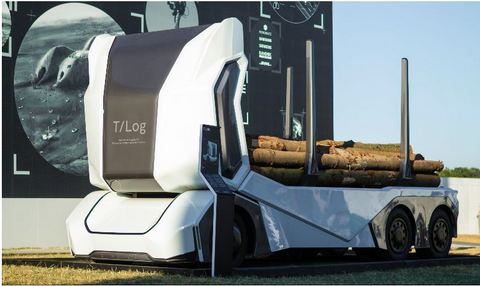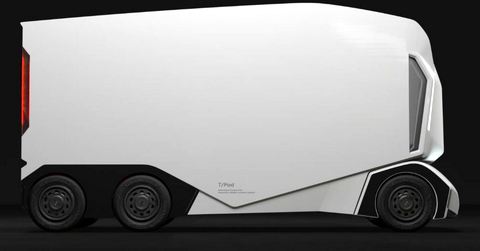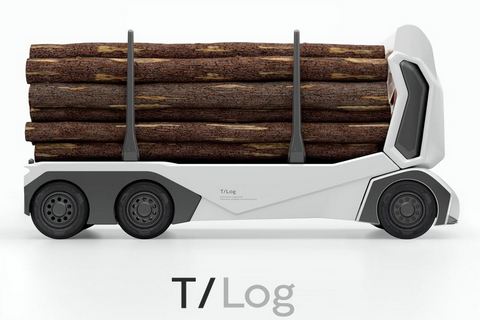Pioneer of Autonomous Electric Transports
When is a truck no longer a truck? What if it no longer has a seat for the driver? What if it even lacks a cab, but can still do the same work? Is it still a truck?

Robert Falck has leapt beyond those questions. He is serial entrepreneur who took his degrees in business, finance and mechanical engineering to Volvo Group (the truck company), where he was director of manufacturing engineering assembly at Volvo GTO (Group Trucks Operations) Powertrain. He left Volvo Group three years ago to found his own company, Einride, where he felt he would be better able to bring his vision to life. That vision is nothing short of a complete transformation of short-haul over-the-road goods transport.
Falck’s inspiration came out of his understanding of the transport system:
“I wanted to solve the transport problems,” Falck told Clean Fleet Report. “I realized the industry was changing fast,” so he left the big multinational corporation to found a more nimble, technology-oriented company focused on a bold concept of the transformation of the transport industry to an emissions-free, safe, cost-effective and sustainable mode.
The Traditional Truck Is Gone
The key to Falck/Einride’s approach is the abandonment of traditional truck configurations. The company’s fresh approach looks at goods movement and envisions the most environmentally efficient way of transporting those goods.
“We looked at logistic needs,” Falck said, “and designed something with an increased payload that was smaller, more agile and therefore more cost-competitive.” Falck indicated that T-pods (his name for his basic “truck” unit) would be custom-designed for individual applications, optimizing their business case. The 200 kilowatt-hour battery pack found in the T-pod could be scaled up or down depending on the regular loads being hauled.

Building on the new electric vehicle convention, a skateboard EV platform, Falck envisions a variety of task-specific vehicles rather than a standard tractor paired with a variety of different trailer/utility combinations, all requiring a driver. The initial models Falck built are the T-pod, a 26-ton delivery model, and the T-log, designed to haul logs.
The T-pod is essentially an electric delivery van box without a cab. Similarly, the T-log looks like the trailer of a logging truck. Both models are outfitted with cameras, radar and Velodyne lidar with an Nvidia Drive computer to find their way. Ericsson and Telia’s 5G connectivity ensure smooth data transmission and operation. The vehicles operate autonomously with the backup of remote-control by a human operator through Einride’s partnership with Phantom Auto. That may be where truck drive jobs migrate to—a desk job with multiple computer screens where a remote pilot can take over on “edge cases” where on-board technology is out of its depth.
Falck looked at the trips that trucks were performing and concluded that some of them could be better performed by autonomous vehicles. He looked beyond the vehicle, too, to the tasks at hand. From that he crafted vehicles tailored to the task and capable of dropping the cost of short-range (200-500 kilometers/125-300 miles is the sweet spot for this technology according to Falck) trips by 50 percent compared to the incumbent diesel trucks.
A Driving Mission
“Einride’s driving mission is to lead the sustainable transition of road freight transportation. 5G provides the connectivity and reliability we need to safely introduce the T-pod on public roads, paving the way for a 90 percent reduction in CO2 emissions and an elimination of NOx emissions,” Falck said this week.

The T-pods began working for paying customers in Europe late last year and 25-30 will be coming to the U.S. this year, Falck told Clean Fleet Report. He added that U.S. production is also planned for the future. A public demonstration of the T-pod will take place next week at the Mobile World Congress 2019 in Barcelona, Spain.
“This is how the future looks,” Falck said. The trillion-dollar transport industry better be ready for a new approach from a company that defines itself not by the specs of its trucks, but as the “intelligent movement company.”
In addition, we just stumbled on yet another new acronym. Falck calls this an AET—autonomous electric transport. So, I guess it is no longer a truck.
Related Stories You Might Enjoy—Electric Truck News
News: Freightliner Delivers eM2 Electric Truck
10 Arguments For/Against Electric Trucks
News: UPS To Test Thor’s Electric Delivery Truck
News: Mercedes eActros Electric Truck Begins Testing
News: Volvo Announces Electric Truck
News: Ford F-Vision: An Electric Autonomous Semi Concept
News: FedEx To Add 1,000 Chanje Electric Vans
Flash Drive: 2017 Chanje V8070 Electric Van
News: Volkswagen e-Delivery Trucks in Brazeil
News: Toyota Shows Off Next Gen Fuel Cell Electric Truck
News: Hyundai Fuel Cell Semi Shown
Make sure to opt-in to the Clean Fleet Report newsletter (top right of page) to be notified of all new stories and vehicle reviews.
